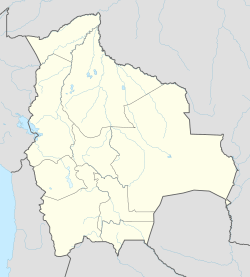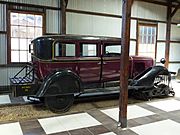Machacamarca, Oruro facts for kids
Quick facts for kids
Machacamarca
Machaqa Marka
|
|
|---|---|
|
Town
|
|
| Country | |
| Department | Oruro Department |
| Province | Pantaléon Dalence Province |
| Municipality | Machacamarca Municipality |
| Canton | Machacamarca Canton |
| Elevation | 12,231 ft (3,728 m) |
| Population
(2001)
|
|
| • Total | 2,206 |
| Time zone | UTC-4 (BOT) |
Machacamarca is a small town in Bolivia. It is located in the Oruro Department, within the Pantaléon Dalence Province. This town is important because it is the main center for both the Machacamarca Municipality and the Machacamarca Canton.
In 2001, about 2,206 people lived there. The town is found south of Oruro. It is also close to the south-eastern part of Lake Uru Uru. A main road and railway line connect Machacamarca to Poopó.
The name Machacamarca comes from the Aymara language. It is spelled Machaqa Marka in Aymara. The word machaqa means "new," and marka means "village" or "town." So, Machacamarca means "new village" or "new town."
Most of the people living in the Machacamarca Municipality are Quechua. About 80.7% of the population belongs to this group.
Contents
Exploring Machacamarca's Attractions
Machacamarca offers several interesting places to visit. These attractions show off the town's history and natural beauty.
Railway Museum
One popular spot is the railway museum. Here, you can see old trains and learn about the history of railways in the area. It is a great place for anyone who loves trains and how they helped towns grow.
Colonial Village of Sora Sora
Near Machacamarca, you can find the colonial village of Sora Sora. This village has an old church that shows the architecture from a long time ago. It is a peaceful place to explore history.
Hot Springs and Ancient Ruins
Machacamarca is also known for its relaxing hot springs. These natural springs offer warm water, which is perfect for a soothing visit. You can also discover ancient chullpas and other ruins nearby. These ruins give us clues about the people who lived in this area many centuries ago.
See also
 In Spanish: Machacamarca para niños
In Spanish: Machacamarca para niños
 | Delilah Pierce |
 | Gordon Parks |
 | Augusta Savage |
 | Charles Ethan Porter |



